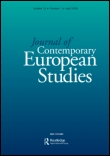
Journal of Contemporary European Studies
Scope & Guideline
Advancing Insight into Europe's Cultural and Political Landscape
Introduction
Aims and Scopes
- European Integration and Governance:
The journal examines the processes, challenges, and outcomes of European integration, including the role of EU institutions and governance mechanisms in shaping member states' policies. - Populism and Political Dynamics:
A significant focus is placed on the rise of populism within Europe, analyzing its impact on political parties, public attitudes, and governance across various countries. - Social Movements and Civil Society:
The journal explores the role of social movements, civil society actors, and grassroots initiatives in influencing policy and public discourse in Europe. - Migration and Refugee Studies:
Research on migration, refugee crises, and their implications for European societies is a core area, especially in light of recent geopolitical events. - Identity and Belonging:
The journal investigates concepts of European identity, national belonging, and how these are influenced by socio-political factors, including migration and historical narratives. - Geopolitical Relations:
The journal addresses the EU's external relations, including its strategic interests and partnerships with neighboring regions and global powers. - Environmental Policies and Sustainability:
Research on environmental governance, sustainability strategies, and the EU's response to climate change is increasingly prominent within the journal.
Trending and Emerging
- Impact of Brexit:
A significant number of recent publications focus on the implications of Brexit, analyzing its effects on UK-EU relations, political dynamics, and public opinion across Europe. - Responses to the Refugee Crisis:
Research addressing the European response to the refugee crisis has gained momentum, exploring policy adaptations, public attitudes, and the role of civil society. - Digital Politics and Social Media:
There is an emerging focus on how digital platforms and social media influence political discourse, public engagement, and the spread of populist narratives. - Climate Change and Sustainability Policies:
Increasing attention is being paid to environmental issues, particularly the EU's strategies for sustainability, climate change adaptation, and energy transition. - Geopolitical Shifts and Security:
Papers examining the geopolitical implications of conflicts, such as the Ukraine war, and their influence on European security policies are trending upward. - Identity Politics and Intersectionality:
An emerging theme involves exploring identity politics through the lens of intersectionality, particularly in relation to migration, race, and gender. - Public Health and Crisis Management:
The COVID-19 pandemic has triggered a surge in research related to public health governance, crisis management, and the EU's role in health policy.
Declining or Waning
- Traditional Nationalism:
There is a noticeable decline in papers focusing solely on traditional nationalism, as the discourse shifts towards more complex identities and transnational narratives. - Static Historical Analysis:
Research that solely analyzes historical events without connecting them to contemporary issues is less prevalent, as the journal increasingly emphasizes current implications. - Economic Policies in Isolation:
The exploration of economic policies as standalone topics is waning; instead, there is a growing trend to integrate economic discussions with social and political dynamics. - Eurocentrism in Studies:
There is a reduction in Eurocentric perspectives that do not consider the influence of global dynamics, as the journal increasingly embraces a more interconnected view of European studies. - Overly Theoretical Frameworks:
Papers relying heavily on abstract theoretical frameworks without empirical grounding are becoming less common as the journal seeks more practical and applicable research.
Similar Journals
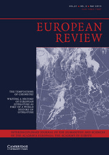
European Review
Advancing Knowledge Across DisciplinesThe European Review, published by Cambridge University Press, serves as a vital platform for scholarly discourse in the fields of Geography, Planning and Development as well as Political Science and International Relations. Since its inception in 1993, this journal has contributed significantly to the academic community, providing a comprehensive review of pivotal issues and emerging trends across Europe and beyond. With an impressive H-Index and ranking in the Q3 category for both Geography and Political Science as of 2023, the European Review is highly regarded among researchers and practitioners interested in interdisciplinary methodologies and innovative research approaches. Although it is not an open-access publication, it offers subscribers access to a wealth of meticulously peer-reviewed articles, making it indispensable for those striving to keep abreast of the latest developments in these dynamic fields. The journal's commitment to fostering knowledge exchange ensures its importance as a resource for students, professionals, and researchers alike.

Romanian Journal of European Affairs
Fostering innovative research in political science and international relations.Romanian Journal of European Affairs is an esteemed open-access academic journal published by the EUROPEAN INST ROMANIA, dedicated to advancing research in the fields of political science and international relations. Established in 2001, the journal has positioned itself at the forefront of European studies, encompassing a diverse range of topics pertinent to the evolution of European policies and their global implications. With an impact factor substantiated by its Q3 ranking in the 2023 category of Political Science and International Relations, the journal stands at a pivotal intersection for researchers, practitioners, and students alike. Its Scopus ranking reflects a growing presence in the scholarly community, making it an essential platform for disseminating innovative research and fostering academic discourse. Based in Bucharest, Romania, the journal not only caters to local scholars but also engages a global audience interested in the dynamic interplay between European affairs and international contexts. By facilitating open access to its content, the Romanian Journal of European Affairs strives to enhance the visibility and impact of research, contributing significantly to the academic dialogue surrounding European integration and policy development.

Contemporary Europe-Sovremennaya Evropa
Connecting Scholars to the Heart of European AffairsContemporary Europe-Sovremennaya Evropa is a leading academic journal published by ROSSIIKAYA AKAD NAUK, INST EVROPY that delves into the intricacies of European political, economic, and social landscapes. With an ISSN of 0201-7083, this journal caters to an essential niche within Social Sciences, particularly focusing on Political Science and Economics. The journal holds a commendable Q3 ranking in both Economics and Econometrics and Political Science and International Relations, reflecting its commitment to disseminating high-quality research relevant to contemporary challenges in Europe. As part of its mission, Contemporary Europe seeks to provide scholars, practitioners, and policy-makers with empirical insights and theoretical frameworks that enhance understanding and foster dialogue in a rapidly evolving geopolitical landscape. Although currently not categorized as Open Access, the journal continues to strive for broader academic reach and accessibility. With a convergence of content from 2016 to 2024, it addresses pressing issues and trends, establishing itself as a valuable resource for those interested in European studies.

Intersections-East European Journal of Society and Politics
Connecting Ideas and Research Across Eastern EuropeIntersections-East European Journal of Society and Politics is a pivotal resource in the fields of Law, Sociology, and Political Science, published by the prestigious CENTRE SOCIAL SCIENCES, HUNGARIAN ACAD SCIENCES. Since its inception in 2015, this journal has been dedicated to exploring the complexities of social and political phenomena within Eastern Europe, making it an essential platform for scholars, practitioners, and students alike. With a focus on fostering interdisciplinary dialogue, it publishes innovative research that critically addresses pressing societal issues and challenges. Despite its current quartile ranking of Q3 in both Law and Sociology and Political Science, the journal's commitment to high-quality scholarship is evident through comprehensive peer-review processes. Accessible to a global audience, this journal aids in the dissemination of vital knowledge and serves as an invaluable asset for anyone seeking to advance their understanding of East European socio-political dynamics.

Europolity-Continuity and Change in European Governance
Championing Open Access to Innovative ResearchEuropolity-Continuity and Change in European Governance, an esteemed journal published by the NATL SCH POLITICAL STUDIES & PUBLIC ADM, delves into the dynamic landscape of European governance, addressing the intricate balance of continuity and change within its frameworks. Established as an Open Access journal since 2007, it aims to disseminate innovative research that fosters dialogue among scholars, policymakers, and practitioners in the fields of political science and public administration. With its ISSN 2344-2255 and E-ISSN 2247-7721, Europolity invites contributions that explore topical issues ranging from policy analysis to governance structures across Europe, making it an invaluable resource for researchers and professionals seeking to understand the complexities of European governance. The journal’s commitment to accessibility and academic rigor ensures that it remains a pivotal platform for thought leadership and scholarly discourse in its discipline.
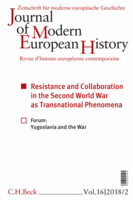
Journal of Modern European History
Innovating Historical Discourse for a Modern EraThe Journal of Modern European History, published by SAGE PUBLICATIONS LTD, is an essential resource for scholars and practitioners in the field of history, particularly focusing on modern European developments. With an ISSN of 1611-8944 and E-ISSN of 2631-9764, this journal boasts a reputation as a Q2 journal in the Arts and Humanities - History category, ranking in the top 25% of its field with a Scopus rank of #404 out of 1760 publications. With its converged years spanning from 2010 to 2024, this journal aims to provide cutting-edge research articles that deepen the understanding of modern European historical events, themes, and methodologies. As a pivotal platform for scholarly discourse, it supports vibrant academic exchange while offering avenues for researchers, professionals, and students to engage with innovative thought in the history domain. For those seeking to expand their knowledge or contribute to the field, the Journal of Modern European History serves as a vital tool for both insight and inspiration.
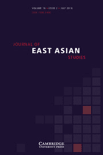
Journal of East Asian Studies
Connecting Scholars to East Asia's Rich TapestryThe Journal of East Asian Studies, published by Cambridge University Press, serves as a pivotal academic platform for scholars and practitioners who are dedicated to the multifaceted exploration of East Asian societies. With an ISSN of 1598-2408 and an E-ISSN of 2234-6643, this journal has been disseminating significant research since its inception in 2008 and continues to be a crucial resource for advancing scholarly dialogue up to 2024. Recognized for its contributions, it holds prestigious quartile rankings in various fields, including Q2 in Development, Political Science and International Relations, and Q3 in Economics and Econometrics, showcasing its broad impact within the social sciences. With Scopus rankings reflecting its robust presence in political science, sociology, and economics, this journal appeals to a wide audience of researchers, educators, and students. As it aims to foster a comprehensive understanding of East Asian political, economic, and social dynamics, the Journal of East Asian Studies remains an essential resource for those looking to engage deeply with the complexities of this vital region.

Studia Europejskie-Studies in European Affairs
Unveiling Insights into European PoliciesStudia Europejskie - Studies in European Affairs, published by the esteemed University of Warsaw Centre for Europe, is an acclaimed peer-reviewed open access journal that has been dedicated to the exploration and critical analysis of European affairs since its inception in 1997. With its ISSN 1428-149X and E-ISSN 2719-3780, this journal serves as a pivotal platform for scholars, researchers, and practitioners who aim to deepen their understanding of European integration, policies, and sociocultural dynamics. The journal plays a significant role in disseminating high-quality research that fosters dialogue and knowledge exchange within the European studies community and beyond. By providing unrestricted access to its content, Studia Europejskie ensures that valuable insights into pressing European issues reach a wide audience, promoting informed debate and academic collaboration. Join a vibrant scholarly community by contributing to and engaging with the latest research on European affairs.
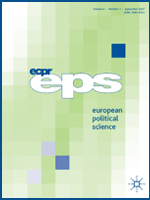
European Political Science
Exploring the Dynamics of European PoliticsEuropean Political Science, published by Palgrave Macmillan Ltd, is a leading journal in the field of political science and international relations, with a commendable impact factor demonstrated by its Q1 category quartile ranking in 2023. Established in 2005, this journal has become an essential platform for disseminating high-quality research and theoretical advancements within the discipline, supported by its significant presence in Scopus rankings where it stands at #106 out of 706 journals. Its distinctive aim is to contribute to the understanding of contemporary political processes, institutions, and ideas across Europe and beyond, while also addressing global issues that resonate with its diverse readership. Although it currently does not offer open access, researchers and practitioners will find valuable insights into critical political dynamics, making this journal an influential resource for students, academics, and policymakers alike.

Asia Europe Journal
Illuminating the Path of International Relations.Asia Europe Journal, published by Springer Heidelberg, serves as a vital platform for scholarly discourse at the intersection of Asian and European studies. With an ISSN of 1610-2932 and an E-ISSN of 1612-1031, this journal has made significant contributions to fields including business management and social sciences, achieving a notable Q2 ranking in both categories as of 2023. With engaging research that explores the complexities and interconnections between these two dynamic regions, the journal aims to foster a greater understanding of cross-cultural phenomena and global trends. Researchers and academics will find value in its robust editorial framework and rigorous peer-review process, making it a reputable source for innovative ideas and empirical studies. As a key resource for navigating contemporary challenges and opportunities in Asia and Europe, the Asia Europe Journal is an essential read for anyone invested in the evolving landscape of international relations and comparative social studies.